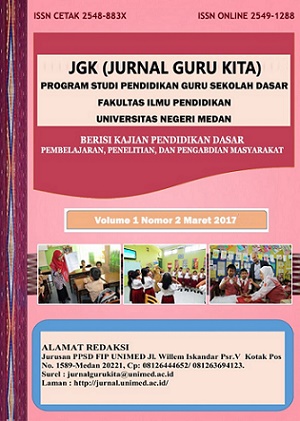Penerapan Model Pembelajaran Think Pair Share Untuk Meningkatkan Aktivitas Belajar Siswa Di Kelas V SD Negeri No. 056614 Sidorejo Semester Genap T.A 2015/2016.
DOI:
https://doi.org/10.24114/jgk.v1i2.6319Abstract
Abstrak : Penerapan Model Pembelajaran Think Pair Share Untuk Meningkatkan Aktivitas Belajar Siswa Di Kelas V SD Negeri No. 056614 Sidorejo Semester Genap T.A 2015/2016. Penelitian ini bertujuan untuk meningkatkan aktivitas belajar siswa dengan menggunakan model pembelajaran Thnik Pair Share di kelas V SD Negeri No. 056614 Sidorejo. Subjek penelitian ini berjumlah 28 orang siswa. Penelitian berlangsung selama dua siklus dapat disimpulkan bahwa 1) Aktivitas belajar siswa melalui penerapan model pembelajaran Thnik Pair Share berdasarkan pengamatan kedua pengamat mengalami peningkatan dari siklus I ke siklus II. 2) Hasil belajar siswa melalui penerapan model pembelajaran Thnik Pair Share meningkat dari siklus I ke siklus II. Kata Kunci: Model Pembelajaran Think Pair Share, Aktivitas SiswaDownloads
How to Cite
Kamaliah, K. (2017). Penerapan Model Pembelajaran Think Pair Share Untuk Meningkatkan Aktivitas Belajar Siswa Di Kelas V SD Negeri No. 056614 Sidorejo Semester Genap T.A 2015/2016. JGK (Jurnal Guru Kita), 1(2), 128–134. https://doi.org/10.24114/jgk.v1i2.6319
Issue
Section
Articles
License
Authors published with the JGK (Jurnal Guru Kita) agree to the following terms:
- Authors retain copyright and grant the journal the right of first publication with the work simultaneously licensed under a Creative Commons Attribution License (CC BY-SA 4.0) that allows others to share the work with an acknowledgment of the work's authorship and initial publication in this journal.
- Authors are able to enter into separate, additional contractual arrangements for the non-exclusive distribution of the journal's published version of the work (e.g., post it to an institutional repository or publish it in a book), with an acknowledgment of its initial publication in this journal.
- Authors are permitted and encouraged to post their work online (e.g., in institutional repositories or on their website) prior to and during the submission process, as it can lead to productive exchanges, as well as earlier and greater citation of published work. (See The Effect of Open Access)


























